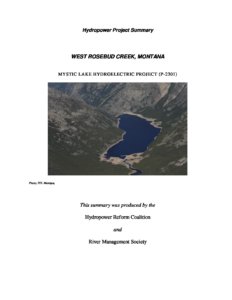Elwha River’s health rebounding as biggest dam removal in history nears completion
(Seattle, WA) – With the final blasts scheduled to remove the remaining 35 feet of Glines Canyon Dam in the coming weeks, the nation’s biggest dam removal project on Washington’s Elwha River is nearing completion. The river restoration effort, which kicked off in 2011, is surpassing expectations and showing great progress, from fish returning, to native plants reclaiming riverbanks, to sand rebuilding the beach at the river’s mouth.
“The story of the Elwha is: We can do it. We can overcome a century of harm. We can work together. We can restore a river. We can show our grandchildren what commitment, responsibility, and stewardship look like. We can be the beneficiaries of an abundance of riches that flow from a river that runs free,” said Bob Irvin, President of American Rivers.
“The Elwha provides the most high-profile proof that dam removal works. On the Elwha, we are witnessing on a grand scale that rivers are ready to come back to life if we just give them a chance.”
“The Elwha is symbolic of our new relationship with rivers. We have the knowledge and tools to restore our rivers, to realize all of the economic, social, and environmental benefits of healthy, free-flowing rivers. Communities nationwide are coming together to remove outdated, unsafe dams and restore river health,” said Irvin.
The Elwha River’s revival has been underway since Elwha Dam was removed in March 2012. Salmon have returned, swimming up past the old Elwha Dam site. This summer, the Washington Department of Fish and Wildlife has counted 1,600 Elwha fall chinook. The salmon runs are strengthening the entire web of life, providing food for a host of wildlife including bear, cougar, bobcat, mink, and otter. Thanks to dam removal and river restoration, Elwha fish populations are expected to reach 400,000 over the next 20 to 30 years. Volunteers have planted native grasses, shrubs and trees to jumpstart the restoration of land exposed by the drained reservoirs. Sediment blocked in the reservoirs behind the dams has moved downstream, creating habitat and restoring the beach at the river’s mouth.
Glines Canyon Dam, once towering 210 feet tall, is the largest dam ever removed. Once crews finish blasting, the Elwha River will flow freely from the mountain wilderness of Olympic National Park to the sea. Removing both dams will open up 70 miles of habitat for salmon.
Many people and groups, led by the Lower Elwha Klallam Tribe, have worked for decades to restore the Elwha. American Rivers advocated for dam removal on the Elwha for more than 25 years, intervening in the dam relicensing proceedings in the 1980’s, and challenging the relicensing of a dam in a national park. American Rivers also helped push the 1992 legislation that authorized dam removal and helped secure federal funding for the Elwha River restoration project. More than 1,100 dams have been removed nationwide, with benefits for river health and clean water, fish and wildlife, public safety, recreation, and local economies.
Dam removal resources:
- National map: www.americanrivers.org/damremovalmap
- Latest statistics: http://www.americanrivers.org/initiative/dams/projects/2013-dam-removals/
- Dam removal background, resources, and successes: http://www.americanrivers.org/blog/american-rivers-damnation-film-guide/
About American Rivers
American Rivers protects wild rivers, restores damaged rivers, and conserves clean water for people and nature. Since 1973, American Rivers has protected and restored more than 150,000 miles of rivers through advocacy efforts, on-the-ground projects, and an annual America’s Most Endangered Rivers® campaign. Headquartered in Washington, DC, American Rivers has offices across the country and more than 250,000 members, supporters, and volunteers.
Rivers connect us to each other, nature, and future generations. Find your connections at AmericanRivers.org, Facebook.com/AmericanRivers, and Twitter.com/AmericanRivers.


